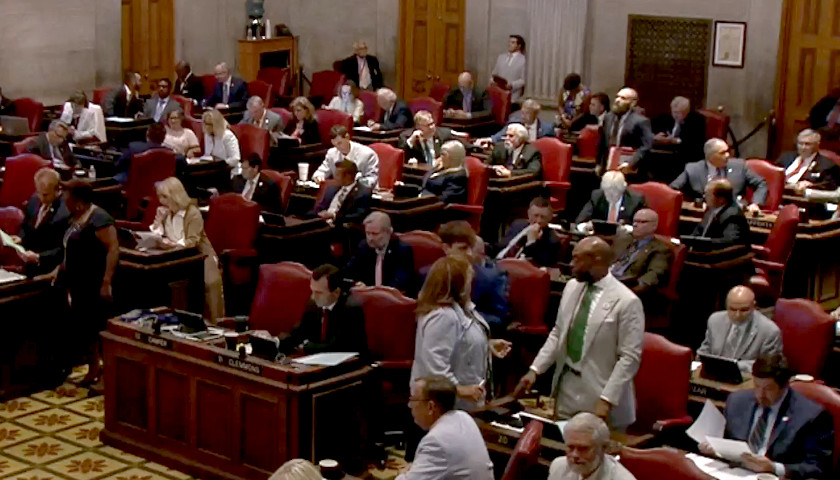After sailing through the Tennessee House of Representatives in March, a resolution proposing congressional term limits via constitutional amendment stands a solid chance of passing in the Senate, according to resolution proponents.
“I think it will go okay,” State Senator Richard Briggs (R-Knoxville), who recently announced that he will serve as Senate sponsor of House Joint Resolution 5, told The Tennessee Star. “I have people say, and I understand the argument, that every election is a term limit. But the public wants [term limits], and if we listen to the public it should pass.”
An overwhelming majority of adults (87 percent) favor limiting the number of terms that members of congress are allowed to serve, according to a Pew Research Center poll in September. A majority (56 percent) of respondents said they strongly favor term limits, while just 12 percent were opposed.
Such strong support has much to do with Congress’ dismally low approval rating, at a meager 13 percent in Gallup’s latest poll on the subject last month.
This year’s Speaker of the House wars and the health and cognition concerns over long-serving, older members of congress have sparked more talk on term limits.
In March, the Tennessee House voted 66 to 27 for the resolution that would add the Volunteer State to the list of six states calling for a constitutional amendment. Alabama, Florida, Missouri, Oklahoma, West Virginia, and Wisconsin have each called for a convention of states under Article V of the U.S. Constitution to propose a term limit amendment.
Aaron Dukette, Central Regional Director for U.S. Term Limits, a national grassroots organization working to “enact and protect term limits on elected offices at all levels of government via the ballot box, legislatures and the courts,” said similar resolutions will be filed in some two-dozen other states in the coming legislative year. He said the movement is close to “sealing the deal” in Georgia and Louisiana, and gaining ground in Arizona, Pennsylvania and Utah.
Term limit advocates will need the support of two-thirds of state legislatures — 34 — to force congress to convene a convention. Proposed amendments require the approval of three-fourths of the states — 38 — to become part of the constitution.
Dukette doesn’t believe the process will need to get that far, that members of congress will eventually see the writing on the wall.
“Realistically, congress is gong to preempt that convention and propose and pass term limits themselves,” he said. “If state legislatures put enough pressure on them they are going to relent and we are going to get it done.”
Even with an overwhelming majority of voters in support of term limits, congress has been loathe to move.
The House Judiciary Committee recently defeated House Joint Resolution 11, sponsored by U.S. Representative Ralph Norman (R-SC-05). House Joint Resolution 11, which has 103 co-sponsors across party lines, lost on a committee vote of 19 to 17.
Briggs, too, is hopeful some applied state pressure will accomplish the mission.
And the state senator shares the concerns that, as Knox County Mayor Glenn Jacobs recently opined, “the [U.S.] Senate now more resembles a high-end assisted-living facility.”
“This is a way to put age limits where age limits aren’t there,” Briggs said.
In short, a term limit of 12 years, for instance, would have sent home members of congress like Senator Dianne Feinstein (D-CA) long before her health and mental acuity, critics say, deteriorated to a point that it impaired her legislative service.
“There would be a few people elected at 70 to congress, but most people would have their facilities about them,” Briggs said. “I think just as important as having the term limits, this would be an indirect way of putting an age limit on that, too. That’s important to me.”
Dukette said it’s not age that’s the problem as much as the longevity of the career politician.
But while a vast majority of voters may support term limits, they keep voting in the incumbents — at a 97 percent rate.
“We think that term limits are so popular because most people believe congress was meant to be a citizen legislature. You do your service to your country and then you go home,” the term limits activist said. “But it has been professionalized; it’s no longer a service, it’s a career.”
Tennessee has already approved a similar measure on congressional term limits. In 2016, the General Assembly passed a resolution calling for a convention of states to propose three amendments to the U.S. Constitution. Tennessee’s resolution seeks a convention with proposals to “impose fiscal restraints on the federal government, limit the power and jurisdiction of the federal government, and limit the terms of office for its officials and for members of Congress.” Nineteen states have approved similar resolutions.
Some Tennessee political observers aren’t so confident that House Joint Resolution 5 will move so swiftly through the state Senate, however. There’s plenty of other pressing business facing the General Assembly in presidential election year.
Briggs said he’s anticipating all will go well, but he said he never bets on anything involving politics. The chairman of the State and Local Government Committee says he’s hopeful the bill will move shortly after the governor’s state of the state address in early February.
– – –
M.D. Kittle is the National Political Editor for The Star News Network.
Image “Tennessee House Floor Session” by Tennessee House of Representatives.








